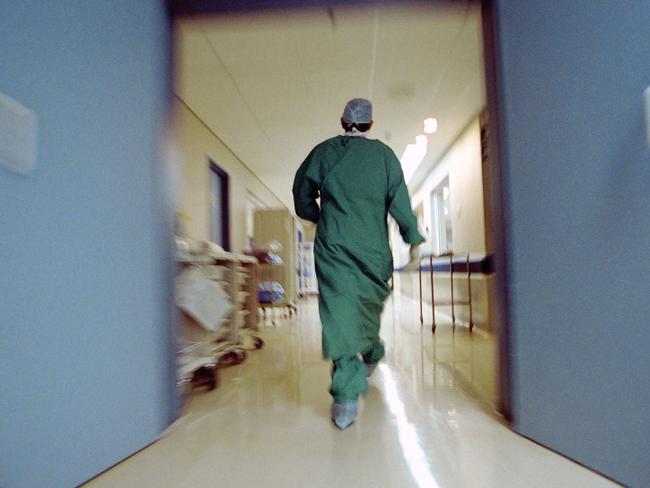Vikki Campion: When push comes to shove, you just want a doctor, especially in rural areas. That’s the real test
If they can deliver a baby, my doc can be from Mars, says Vikki Campion. So stop setting “cultural” tests that keep overseas-trained medicos in cabs instead of saving lives in rural areas.

Opinion
Don't miss out on the headlines from Opinion. Followed categories will be added to My News.
In the throes of childbirth, when things start to go wrong, partially compos mentis as waves of contractions wrack your body, and you hear muttered conversations of a weakening baby heart beat, you could not care less if your doctor was from Mars so long as he gets that newborn out alive.
My obstetrician endured extreme communism in his life before rural Australia, where he had worked in baby factories in Bulgaria and delivered more than 27,000 infants — more than the entire population of our city.
But in those terrifying moments, when that new life could be lost, I did not care whether my doctor was from Armidale or Alor Setar so long as he could deliver the baby safely.
He was not politically correct — he had no time for whimsical birthing plans, you could have your birthing plan or his, and in his, the child was born alive.
As such, I worshipped him.

If you are a man, replace “birth” with “heart attack”.
When you are grabbing your chest, any doctor is better than none.

In remote and regional areas, we have more hospitals than doctors, with locums flown in at a cost of $3000 a day to cover extreme shortages.
In country areas, the GP is often the one who delivers the babies and the one who triages car crash victims.
In response, towns worship them, no matter where they are from, because they are the difference between finding out if there is a God or not.
The key reason why we don’t have rural doctors is we are growing a workforce for places that already have them.

The 50 per cent of local medical graduates that once went into general practice has dwindled to 16 per cent and the number of GPs is not keeping pace with the number of patients.
Labor’s mistake in changing District Priority Area status from rural and remote areas to include cities recently was to assume that it will make it easier to see a doctor, when all it serves to do is pull the doctors we did have in Lismore to the Gold Coast hinterland, but does nothing to grow a workforce where we need it.
Logic has been overtaken by “cultural” politics.
Overseas-trained doctors are required to pass a PESCI exam, that they say assesses among other things, their “cultural affinity, before they can start giving you CPR from a clinic.
Regional clinics are increasingly frustrated with the PESCI which has a 70 per cent failure rate, costs doctors more than $2000, and can take 24 months to complete.
DRIVING TAXIS, NOT SAVING LIVES
While they may have worked for more than a decade in their country of birth, and have more experience than the people assessing them, they fail at astonishing rates, not because of a lack of clinical knowledge but due to vague “cultural” criteria which is never fully explained.
How will an overseas-trained doctor learn how to deal with an Aboriginal or Torres Strait Islander woman without ever getting the chance to treat her?
Even if they pass the test, they have to work under direct supervision anyway — so what is the danger?
Tests keeping doctors driving taxis in metropolitan Sydney when they could be saving lives, reeks of gatekeeping and racism.
From personal experience I can tell you the most non-judgemental, broad-minded, culturally-aware people are regional people who would accept a doctor who believed the moon was made of cheese as long as their medical knowledge was sound.
They don’t care if you are gay, straight, Buddhist, Christian, black or white, it is irrelevant so long as you can get that baby out, keep that heart pumping, and keep those car crash victims alive.
They might have a stud book for their stock, but they could not care less beyond competency of where their doctors come from.
But we have decided to make it difficult for them to come to regional towns.
Weary Dunlop was admired because, with the scantest of resources, he kept people alive; he is lauded in the annals as an exceptional doctor because under pressure in the direst of circumstances, he could do that.

That is the life of country doctors, they are heroic figures and not an ill word is spoken about them because the alternative to that doctor is no doctor.
Unless we get our overseas-trained doctors out from behind the wheel of an Uber and into regional areas, we are doing nothing to increase our overall workforce.
This is a test for the new government, are you locked into cultural ideology, or are you locked into outcomes? Easier immigration if you want to be an Uber driver, but not if you want to be a doctor.
Labor promised a $750 million Strengthening Medicare Taskforce but it must recognise that without doctors in regional communities, more money into Medicare doesn’t make any difference.
With no doctor, there is no rebate.
With no doctor, there is no script.
The pains of birth, heart attack, or a sick child fast bring you back to a real sense of what is important, so why are we so hung up on some peculiar test that fails on “cultural” understanding, so applicable to virtue-signalling medicos who voted for the Teals but so irrelevant to rural seats where Aboriginal and Torres Strait Islander women need health care?
As you grasp at your chest, do you care whether your doctor was born in Annandale or Andhra Pradesh?
If they can keep you alive, they are the doctor for you.



